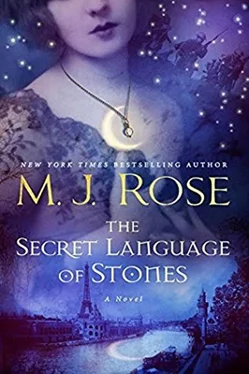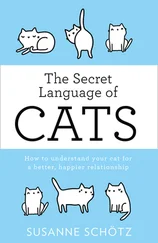After making a talisman, I would decorate it with jet and gold, lock it, and hang it from a cord. A small gold key, attached to the knot on the chord, dangled at the back of the wearer’s neck.
Once completed, I would present the charm to my client. After putting it on, I would instruct her to clasp the talisman, and then I would cover her hands with my own. Shutting my eyes, I focused. Typically, I would hear a cacophony of all manner of noise at first. Human voices, wind, rain, the ocean’s waves, train whistles, automobile horns, ambulance sirens. Withstanding the onslaught, fighting the discomfort, I would concentrate, and in a matter of minutes, as clearly as if he were in the room with us, one soldier’s voice would rise above the rest. Inside my head.
Sons to mothers, husbands to wives, fathers to daughters, brothers to sisters, lovers to lovers, the communiqués were deeply personal, and often I blushed with embarrassment at having to speak their words aloud. But my discomfort only lasted a few minutes; it was clear to me that the solace I gave would probably last forever. From what I could gather from their messages, the soldiers seemed trapped in a kind of purgatory like the one Dante wrote about in his great poem. They were souls awaiting entry to heaven, unable to completely leave this realm until they found some kind of release I didn’t yet understand.
In all the time I’d been doing this, none of the soldiers had ever spoken to me . Their spirits seemed unaware of a conduit.
“What you said to Madame Maboussine, you weren’t making it up, were you?”
“What kind of monster would I be to lie? We don’t make profit on the charms. I have nothing to gain,” I said.
“You might be looking for fame.”
“As you yourself said, what I do is now illegal. Fame is the last thing I’d want.” This interview wasn’t getting off to a good start. I didn’t blame Madame for being suspicious, but her questions bordered on rudeness. There was more I could have said. I could have told her how frightening it was to dwell in the land of the dead and that I would never willingly journey there. I could have told her it was like entering what one might imagine hell to be like. If I could, I would have boarded up the gateway that connected me to these souls.
“I’m sorry,” she said. “It’s just that I’ve never believed that what you do is possible.”
“Neither do I, actually.” I smiled at her.
Madame Alouette returned her son’s hair to the envelope, which she handed to me with a reluctance that tore at my heart. As I reached for it, the scent of apples materialized, and a combination of nausea and dizziness descended over me.
Pulling out one of the boxes we use to encase our jewels, I quickly slipped the envelope inside, trying to outpace the headache coming on. I’d learned that if I could tuck the soldier’s item away fast enough, I could prevent myself from becoming ill in front of my client.
Taking an ivory label from the desk, I picked up my pen, dipped it in the Baccarat inkwell on the table, and wrote out Madame Alouette’s name. After placing the label on the box’s lid, I slipped the package inside a drawer.
“Are you all right?” Madame asked.
Usually, so caught up in their own turmoil, my clients failed to notice mine.
“Just the beginning of a headache. How did you know?”
“I’m a sculptor, I study people’s faces, I recognized the changes on yours. Are you all right?”
“Yes, I’ll be fine.”
“It began the moment you touched the envelope, didn’t it?”
I nodded.
She placed her hand on top of mine. “This ability you have, is it painful?”
“Not compared to your pain.”
“Can you describe it?”
I hesitated.
“I’d like to try and understand.”
“The objects often cause me distress when I first come in contact with them. As if my body is rebelling and doesn’t want me to take on a new assignment.”
“You have to steel yourself?”
I nodded.
“Yes,” she said. “It’s like that when a new soldier comes in to see me. I pretend I can deal with his deformity. That my stomach isn’t churning. That I didn’t wish I could look away. What happens to you exactly?”
“I smell apples, even if there are none to be seen. And my head fills with noise, starting an avalanche of pain.”
Madame Alouette nodded, but I stopped. She didn’t need to hear more, and it wouldn’t do to share any more details with a stranger, especially one suffering her own crisis. There was no reason for her to know that once I finished fashioning a locket I was so exhausted and depleted that often Monsieur Orloff sent me to bed. Anna would serve me hot tea sweetened with jam and laced with brandy and sit with me.
Neither did Madame Alouette need to hear about the despair that would follow the next day, that fell like a thick heavy curtain around me and made me feel as if I inhabited some other world… not quite here on earth… but not quite in the land of the dead either.
“And yet you do it? You willingly put yourself in this state of distress.” Madame Alouette wasn’t asking me a question. She was telling me something she knew about me because she shared that willingness with me. “You are very brave, Mademoiselle, and very kind.”
Tears came to my eyes. I shook my head. “Neither brave nor kind,” I said. “If I can help, I must.”
Yes, it all started with helping. That was what I had come to Paris to do. Or so I thought. I now know it was more selfish than that. Offering comfort to strangers, I tried to assuage the guilt I lived with. Timur had died without any hope. That was the real reason I forced myself to help these mothers and wives, sisters and lovers. As physically ill as it made me, as frightening as it seemed, it was my penance for what I’d done to one boy who’d gone off to the war and died without the comfort I could have given but withheld.
“The tsar has been shot,” Monsieur Orloff said, looking up from the newspaper trembling in his hands like leaves buffeted by the wind. “The reports we’ve received since June twenty-fourth are all true.”
“What exactly does the article say, Pavel?” Anna asked.
Twice he tried to read it out loud, but his voice shook worse than his fingers. Anna put her hand on his shoulder.
“Let Alexi read it,” she said, taking it from her husband and giving it to their friend and fellow expatriate Alexi Vanya.
Often during the week I joined the Orloffs for dinner, as did an assortment of Russian émigrés. In Paris, there were thousands of tsarists, Russian refugees who despised the Bolsheviks and their actions against Mother Russia. Most White Émigrés, as they were known, had arrived in 1917. But others who were more insightful and less stubborn started to see what the future held as early as 1905. Every day still more escaped. And many of them found their way to a secret political opposition group called the Two-Headed Eagles, founded by Monsieur.
Named after the Romanov dynasty’s symbol, the group aimed to overthrow the Bolsheviks and restore the imperial family to the throne so they might all be able to return home. Fearful that Bolshevik spies would somehow infiltrate the group, the Two-Headed Eagles met clandestinely in one of the labyrinthine underground chambers here beneath the Palais Royal.
Vanya began to read. “ ‘At the first session of the Central Executive Committee’…” His voice cracked. He fished in his jacket for a handkerchief, wiped at his eyes, tried to read again, and then gave up. He handed the newspaper to Grigori, Monsieur Orloff’s eldest son from a previous marriage. After three years of fighting, an injury had ended Grigori’s career as a soldier and he’d moved back home, taking an apartment on the other side of the complex and opening an antiques shop next door to La Fantaisie Russe.
Читать дальше












